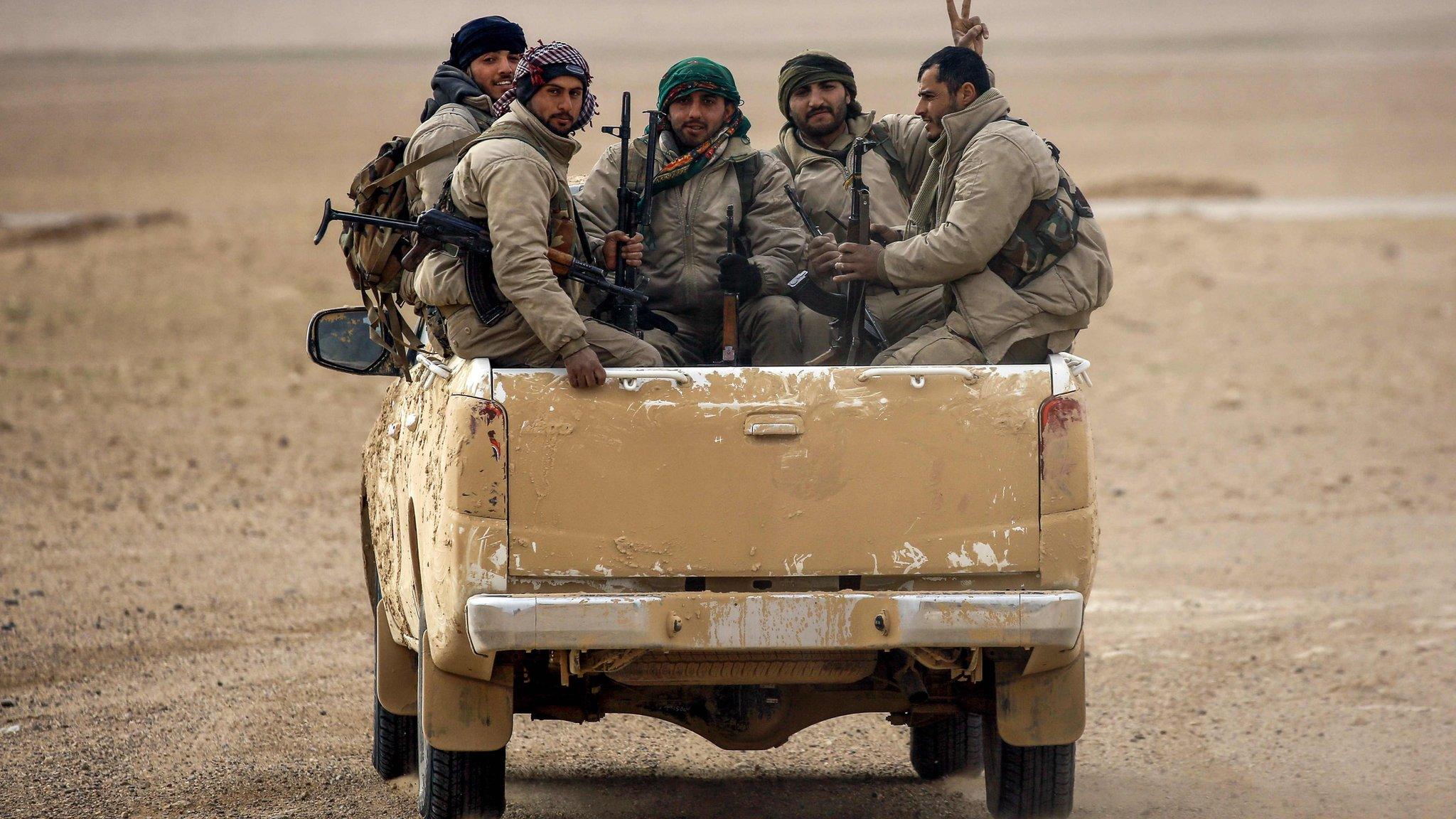Turkey targets Kurdish forces in Afrin: The short, medium and long story
- Published
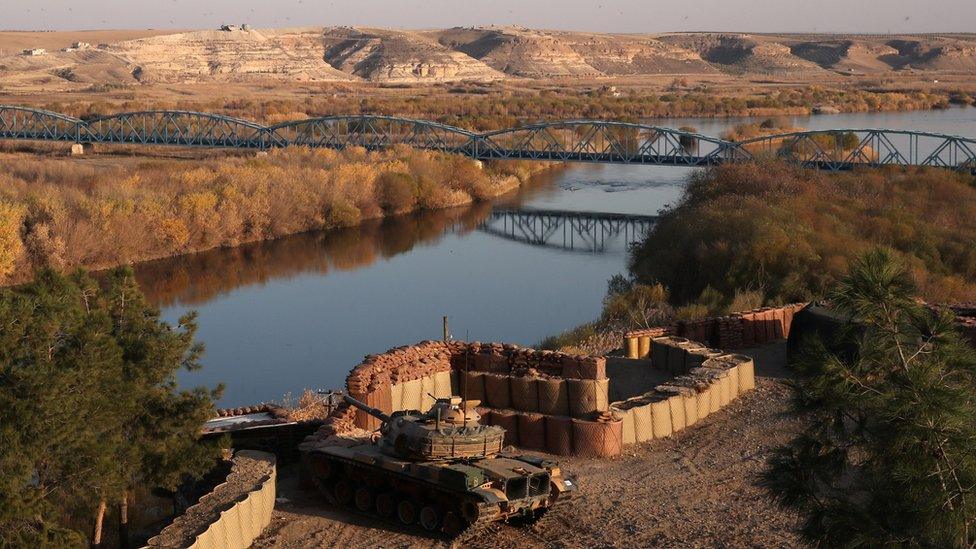
A Turkish tank positioned on the Turkish-Syrian border near Manbij in December
Turkey says it has begun a massive assault on Kurdish forces on the other side of the border with Syria - potentially putting it in direct conflict with its Nato ally, the United States.
This could become a significant new development in the Syrian civil war, which is now almost seven years old. We've boiled down why it matters.
You can choose to read the short, medium or long story below, either by themselves or one after the other.

Why is Turkey mounting this assault?
One main reason: Turkey considers the US-backed Kurdish militia that controls much of north-eastern Syria a terrorist group.
Turkey says the militia is an extension of a Kurdish rebel group it has fought for decades, and wants to prevent it consolidating its hold on Syrian territory.
Recent US plans to help the militia form a 30,000-strong "border security force" alarmed Ankara.
Turkey's president said Washington was "creating a terror army" and vowed to "suffocate" it.
Turkey wants to clear Kurdish forces from Afrin - where operations began on 20 January - and Manbij.

Turkey has vowed to crush a Syrian Kurdish militia called the People's Protection Units (YPG), which it considers a terrorist group.
Turkish President Recep Tayyip Erdogan says it is an extension of the banned Kurdistan Workers' Party, which has fought for Kurdish autonomy in Turkey for three decades.
The YPG denies any direct organisational links - an assertion backed by a US-led coalition whose air strikes have helped the militia and allied Arab fighters drive Islamic State militants from tens of thousands of square kilometres of Syria.
Ankara has condemned the US for supporting the YPG and was alarmed when it recently emerged that the coalition was helping it form a 30,000-strong "border security force".
While Turkey has long threatened to clear YPG fighters from the Kurdish enclave of Afrin, in north-western Syria, and Manbij, a mainly Arab town to the east, the news appears to have brought those plans forward.

A day after vowing to stop the US "creating a terror army on our border", Mr Erdogan declared that Turkish troops and allied Syrian rebels would soon destroy "nests of terror".
Turkish tanks began building up along the border near Afrin and troops have been shelling the enclave from inside the rebel-held Syrian province of Idlib. Air strikes were launched on 20 January as Turkey announced the operation had begun.
Kurdish leaders promised to defend Afrin and urged the international community to prevent Turkey targeting what they said were its 1m residents.
Russia, the Syrian government's ally, says it will not interfere in the conflict. It has have moved its troops away from the area. A Turkish assault has opened a new front in a war that activists say has already cost more than 340,000 lives.
The UN says it is ready to help displaced civilians if required.

To understand the seemingly imminent offensives, it's important to understand Turkey's relations with the Kurds, and who some of the main players are in the Syrian conflict.
Why is Turkey targeting the Kurds?
Turkey had been threatening to attack the Kurdish-controlled towns of Afrin and Manbij for some time in an attempt to counter a militia called the People's Protection Units (YPG), which it considers a terrorist group.
Turkey sees the militia as being an extension of the Kurdistan Workers' Party (PKK), which is banned in Turkey and has fought for Kurdish autonomy there since 1984.
The YPG denies any direct military or political links with the PKK.
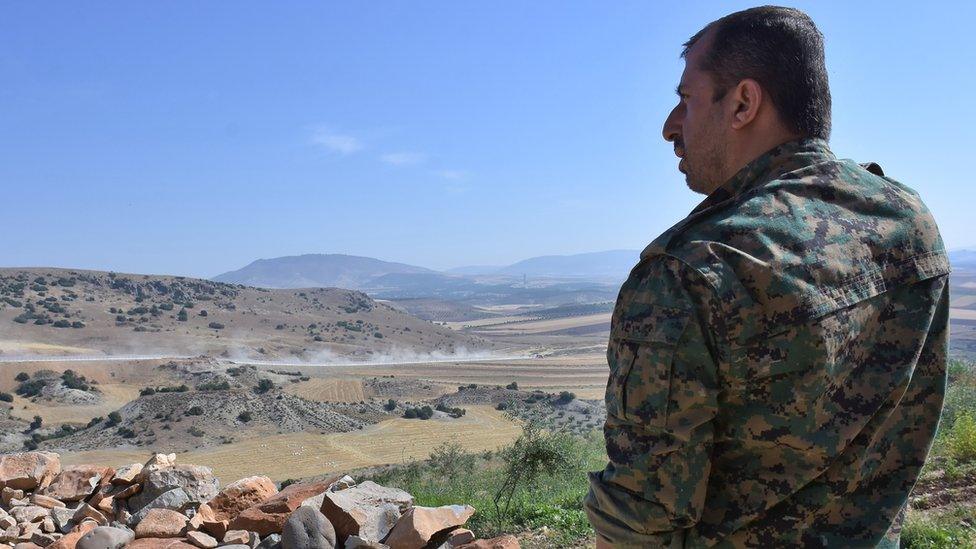
A YPG fighter monitoring the area near Afrin in June 2017
The US also rejects Turkey's portrayal of the militia, a key ally in the battle against Islamic State.
The YPG is part of an alliance with a number of ethnic Arab militias called the Syrian Democratic Forces (SDF). With the help of US air strikes, its fighters have captured tens of thousands of square kilometres from IS.
Despite being part of the US-led coalition against IS, Turkey has vehemently opposed supporting the SDF and tried to stop it taking control of Syria's northern border.
In 2016, the Turkish military supported a Syrian rebel offensive that drove IS militants out of the key towns of Jarablus and al-Bab and stopped SDF fighters moving towards Afrin.
The US dissuaded Turkey from also attempting to take the mainly Arab town of Manbij from the SDF by force, but got the YPG to agree to withdraw east of the River Euphrates. Turkish officials say that has not yet happened.
One recent development appears to have brought forward Turkey's plans to clear YPG fighters from Afrin and Manbij.
What's happened most recently?
News broke on 13 January that the US was helping the SDF build a new "border security force".
US officials said the plan was to train about 30,000 personnel - half of them SDF fighters - to help prevent infiltration by IS militants across the Turkish and Iraqi borders and parts of the River Euphrates, which effectively divides SDF- and Syrian government-held regions.
The announcement enraged Turkey. President Recep Tayyip Erdogan said that he considered the border force to be a "terror army".
Syria's government, which has mostly avoided conflict with the Kurds, called it a "blatant attack" on its sovereignty. Russia, the government's ally, warned it was a step towards the partition of Syria.
Mr Erdogan went on to say Turkish troops and Syrian rebels would soon destroy "nests of terror" along its border, "starting with Afrin and Manbij".
What's at stake in Afrin?
It's significant for a few reasons:
Afrin is separated from Manbij and other SDF-controlled areas by a pocket of territory held by Turkish-backed rebels
If Afrin and Manbij were to fall, Turkish-backed forces would control a 200km (125-mile) continuous stretch of Syria's northern border west of the Euphrates
The YPG has not said how many fighters it has in the two areas, but Turkey's state-run Anadolu news agency estimated that there were about 8,000 to 10,000 in Afrin.
It is also not clear if US military personnel are deployed around Manbij, as they were last year.
Does the Turkish assault on Afrin matter?
It risks bringing the interests of two Nato allies into direct conflict and also have a major impact on relations between Turkey and Russia.
Russia - a key military figure in the region - has said it will not interfere in the conflict.
As Turkey announced it was beginning the assault on Afrin, Russia said its troops had been relocated elsewhere.
Russia controls the enclave's airspace - so Turkey's air strikes that began on 20 January must have had Russian clearance.
As this piece explains, a tacit Russian approval for the incursion might bring Moscow and Ankara closer together and have implications for Turkish relations with the West.
A siege of Afrin could have grave humanitarian consequences.
Kurdish officials say there could be 1m people living in Afrin.
Leaving an enclave surrounded by territory held by the Syrian government, and mountains, would be difficult. The UN's refugee agency told the BBC it was prepared to help if needed.
- Published17 January 2018
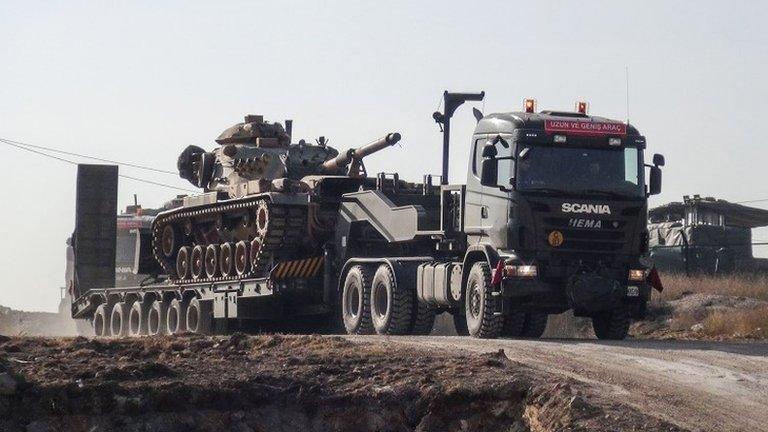
- Published15 October 2019
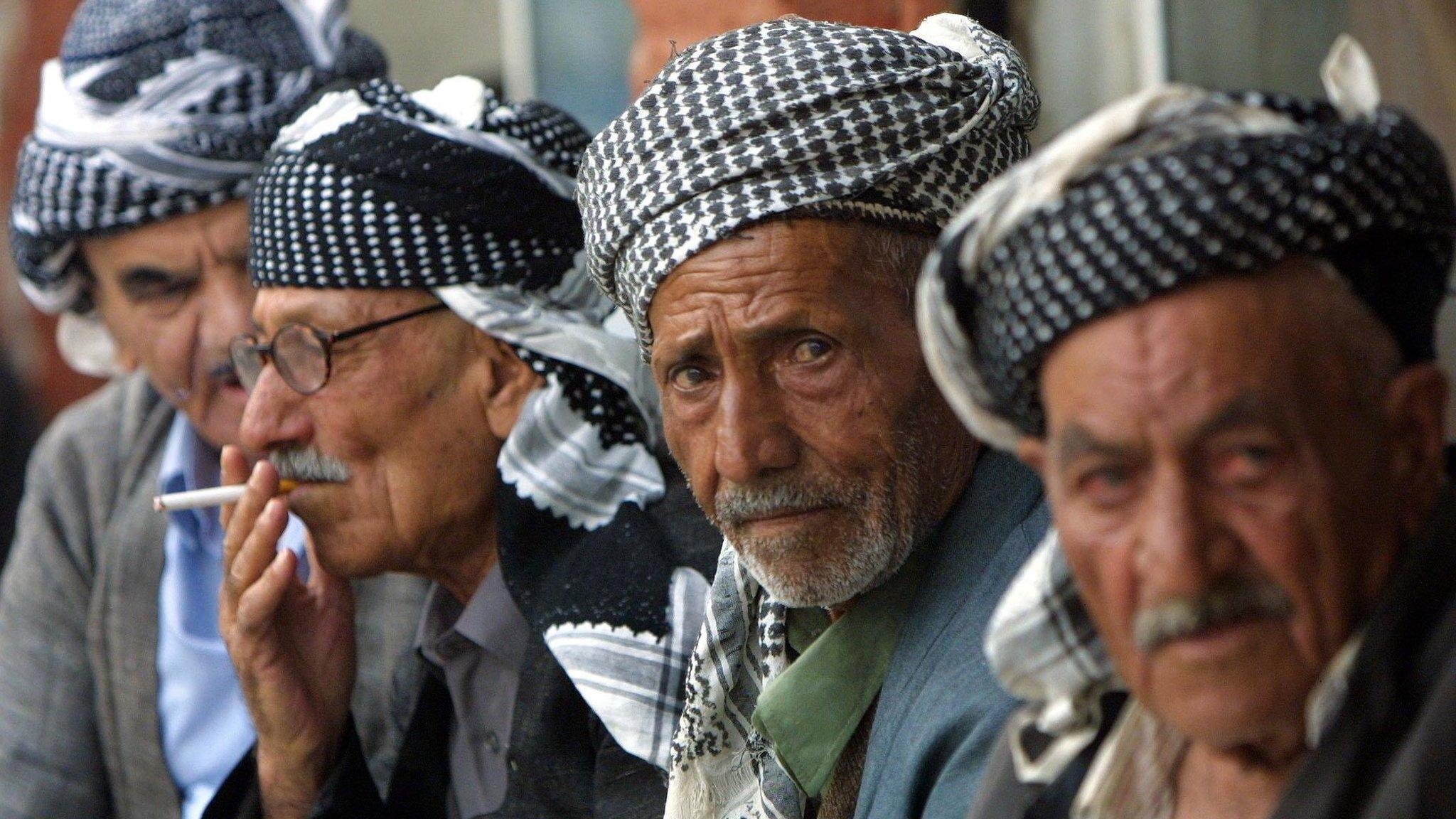
- Published15 January 2018
